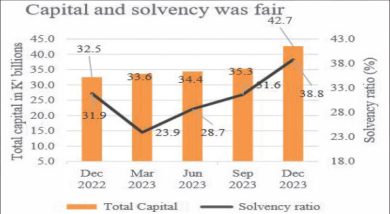Industry output drops
Malawi Confederation of Chambers of Commerce and Industry (MCCCI) says output for firms that use imported raw materials has declined following global travel restrictions instituted in the wake of Covid-19 pandemic.
MCCCI figures show that prior to the pandemic, utilisation capacity of 52 percent of the firms in the manufacturing sector was between 50 percent and 75 percent.
During the same period, the figures show that capacity utilisation of 37.5 percent of firms in other sectors was between 76 and 100 percent.
MCCCI figures further show that the number of firms producing at between 50 percent and 75 percent has declined to 43.6 percent.
The chamber said that even firms that were producing above 76 percent have declined by 28.4 percentage points to 9.1 percent. This leaves an estimated 52.7 percent of firms operating at below 50 percent compared to the 10.5 percent of firms that were producing at below 50 percent before the pandemic.

In a written response on Monday, MCCCI director of business environment and policy advocacy Madalitso Kazembe said with most manufacturing firms relying on imported raw materials for production, restrictions in other countries have impacted the sector.
She said: “Others are facing delays to receive their cargo and some cannot even access the raw materials at all, especially those that rely on cargo flights.
“Overall, production in the manufacturing sector is low due to subdued demand on the market as consumers are also facing liquidity constraints.”
Kazembe, however, said despite the capacity utilisation being down for manufacturing firms, the worst-hit sector remains the retail and services sector and small and medium enterprises, including cross-border traders, as they heavily rely on imports.
While manufacturing is no longer the primary driver of the economy, with its gross domestic product (GDP) contribution at 9.1 percent, it still influences the economy to a large extent, particularly for unskilled workers.
Wholesale and retail trade, on the other hand, contributes 15.7 percent to broadest measure of economic output.
Despite the Malawi Government implementing policies aimed at supporting the private sector and promoting value addition, the country continues to witness slow industrial growth.
The United Nations Industrial Development Organisation ranks Malawi, alongside Burundi and Chad, as some of sub-Saharan African economies to have experienced industrialisation with their manufacturing value-added share falling since 1990.
This is contrary to goal number 9.2 of the United Nations Sustainable Development Goals on promoting inclusive and sustainable industrialisation by 2030.
African Development Bank figures show that the country’s manufacturing sector ratio of total employment has dropped by five percentage points from 19 percent in 1994 to 14 percent in 2017.
Frederick Changaya, chairperson of National Working Group on Trade Policy, said in an interview on Monday that the country needs to reduce its dependence or retail trade as it takes away value-addition and employment.
He said: “Government needs to put in place policies that encourage industrial sector growth. No country develops when it consumes more from outside than locally made products.”
Minister of Trade Sosten Gwengwe admitted in an earlier interview that Covid-19 has disrupted global trade with Malawi not . However, he said formulating the right policies will give an opportunity for people to trade.
He said: “A lot is hinging on experts from Ministry of Health. We would want to understand that the disease is here to stay and we need to have technical advice on how trade can continue.”




